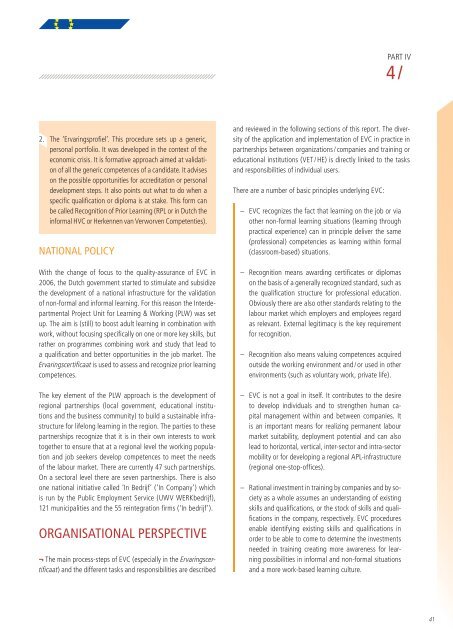RECOGNITION OF NON-FORMAL AND INFORMAL ... - Solidar
RECOGNITION OF NON-FORMAL AND INFORMAL ... - Solidar
RECOGNITION OF NON-FORMAL AND INFORMAL ... - Solidar
Create successful ePaper yourself
Turn your PDF publications into a flip-book with our unique Google optimized e-Paper software.
PART IV<br />
4 /<br />
2. The ‘Ervaringsprofi el’. This procedure sets up a generic,<br />
personal portfolio. It was developed in the context of the<br />
economic crisis. It is formative approach aimed at validation<br />
of all the generic competences of a candidate. It advises<br />
on the possible opportunities for accreditation or personal<br />
development steps. It also points out what to do when a<br />
specifi c qualifi cation or diploma is at stake. This form can<br />
be called Recognition of Prior Learning (RPL or in Dutch the<br />
informal HVC or Herkennen van Verworven Competenties).<br />
NATIONAL POLICY<br />
With the change of focus to the quality-assurance of EVC in<br />
2006, the Dutch government started to stimulate and subsidize<br />
the development of a national infrastructure for the validation<br />
of non-formal and informal learning. For this reason the Interdepartmental<br />
Project Unit for Learning & Working (PLW) was set<br />
up. The aim is (still) to boost adult learning in combination with<br />
work, without focusing specifi cally on one or more key skills, but<br />
rather on programmes combining work and study that lead to<br />
a qualifi cation and better opportunities in the job market. The<br />
Ervaringscertifi caat is used to assess and recognize prior learning<br />
competences.<br />
The key element of the PLW approach is the development of<br />
regional partnerships (local government, educational institutions<br />
and the business community) to build a sustainable infrastructure<br />
for lifelong learning in the region. The parties to these<br />
partnerships recognize that it is in their own interests to work<br />
together to ensure that at a regional level the working population<br />
and job seekers develop competences to meet the needs<br />
of the labour market. There are currently 47 such partnerships.<br />
On a sectoral level there are seven partnerships. There is also<br />
one national initiative called ‘In Bedrijf’ (‘In Company’) which<br />
is run by the Public Employment Service (UWV WERKbedrijf),<br />
121 municipalities and the 55 reintegration fi rms (‘In bedrijf’).<br />
ORGANISATIONAL PERSPECTIVE<br />
¬ The main process-steps of EVC (especially in the Ervaringscertifi<br />
caat) and the different tasks and responsibilities are described<br />
and reviewed in the following sections of this report. The diversity<br />
of the application and implementation of EVC in practice in<br />
partnerships between organizations / companies and training or<br />
educational institutions (VET / HE) is directly linked to the tasks<br />
and responsibilities of individual users.<br />
There are a number of basic principles underlying EVC:<br />
– EVC recognizes the fact that learning on the job or via<br />
other non-formal learning situations (learning through<br />
practical experience) can in principle deliver the same<br />
(professional) competencies as learning within formal<br />
(classroom-based) situations.<br />
– Recognition means awarding certifi cates or diplomas<br />
on the basis of a generally recognized standard, such as<br />
the qualifi cation structure for professional education.<br />
Obviously there are also other standards relating to the<br />
labour market which employers and employees regard<br />
as relevant. External legitimacy is the key requirement<br />
for recognition.<br />
– Recognition also means valuing competences acquired<br />
outside the working environment and / or used in other<br />
environments (such as voluntary work, private life).<br />
– EVC is not a goal in itself. It contributes to the desire<br />
to develop individuals and to strengthen human capital<br />
management within and between companies. It<br />
is an important means for realizing permanent labour<br />
market suitability, deployment potential and can also<br />
lead to horizontal, vertical, inter-sector and intra-sector<br />
mobility or for developing a regional APL-infrastructure<br />
(regional one-stop-offi ces).<br />
– Rational investment in training by companies and by society<br />
as a whole assumes an understanding of existing<br />
skills and qualifi cations, or the stock of skills and qualifi<br />
cations in the company, respectively. EVC procedures<br />
enable identifying existing skills and qualifi cations in<br />
order to be able to come to determine the investments<br />
needed in training creating more awareness for learning<br />
possibilities in informal and non-formal situations<br />
and a more work-based learning culture.<br />
41
















